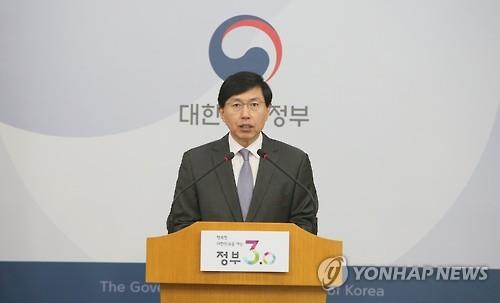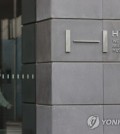- California Assembly OKs highest minimum wage in nation
- S. Korea unveils first graphic cigarette warnings
- US joins with South Korea, Japan in bid to deter North Korea
- LPGA golfer Chun In-gee finally back in action
- S. Korea won’t be top seed in final World Cup qualification round
- US men’s soccer misses 2nd straight Olympics
- US back on track in qualifying with 4-0 win over Guatemala
- High-intensity workout injuries spawn cottage industry
- CDC expands range of Zika mosquitoes into parts of Northeast
- Who knew? ‘The Walking Dead’ is helping families connect
S. Korea urges Japan to stop claims to Dokdo

Foreign Ministry spokesman Cho June-hyuck speaks during a press briefing in this photo taken on March 29, 2016.
SEOUL, (Yonhap) — South Korea on Thursday urged Japan to stop making claims to Korea’s easternmost islets of Dokdo as Tokyo is poised to issue a 2016 diplomatic white paper that reportedly includes a sovereignty claim to the islets.
“Dokdo is Korea’s inherent territory historically, geographically and by international law,” Seoul’s Foreign Ministry spokesman Cho June-hyuck said during a regular press briefing, pointing out that Seoul is “closely watching the situation.”
“Japan must immediately stop any kind of provocation vis-a-vis our territorial sovereignty.”
Tokyo’s repeated claims to Dokdo have been an abiding source of friction between the two countries, particularly when the two sides seek to enhance their security cooperation in the face of a provocative North Korea.
Some observers fear that the territorial spat could dampen the cooperative mood between them that emerged after they reached an agreement in December to settle the decades-long issue of Japan’s wartime sexual enslavement of Korean women.
Tokyo’s diplomatic white paper is expected to be issued this month after it is reported to the cabinet next week, Japanese reports said. Japan has included its claim to Dokdo in the document for nearly a decade.
In a sign of improvement in bilateral ties, the white paper reportedly describes South Korea as Japan’s most important neighbor “sharing strategic interests.” In a 2015 document, South Korea was depicted just as Japan’s most important neighbor.
Tensions between Seoul and Tokyo flared anew last month after Tokyo authorized dozens of updated high school textbooks that contain territorial claims to Dokdo.
The authorization of the textbooks to be used from April next year represented a bolstering of Tokyo’s claims to Dokdo, because 27 of the newly approved 35 social studies textbooks — or nearly 80 percent — claim that the South is “illegally occupying” the islets.
Korea has been in effective control of the islets with a small police detachment since its liberation from Japan in 1945.















